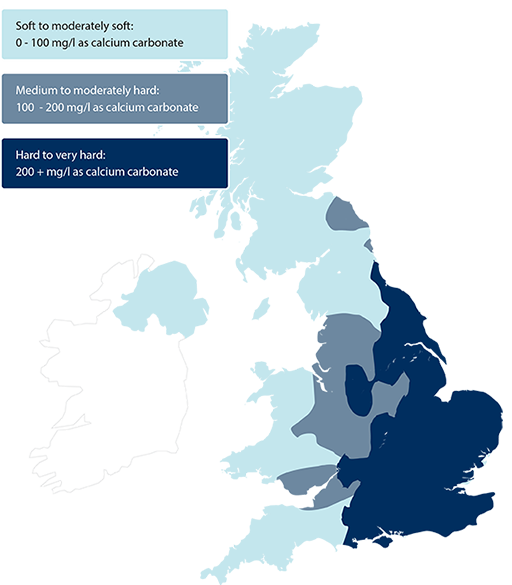1.1 Water
You may be surprised to hear that water usually makes up 90–96% of beer, the rest being mainly alcohol and compounds to flavour it. Believe it or not, this high percentage of water has a large impact on the flavour of the beer and historically has led to certain types being predominantly brewed in specific areas.
Different types of beer can be brewed depending on the hardness of the water. Hard water is best suited to stout type beers such as Guinness, whereas soft water is better for light, hoppy beers such as lager and pilsners.
Do you think Dublin is likely to have hard or soft water?
Dublin is well known for its production of Guinness, and the area has particularly hard water.
Many Guinness fans are convinced that Guinness produced in Dublin is superior to that brewed in other locations. They may well be correct – Dublin’s particularly hard water contains large amounts of bicarbonates and calcium which raise the pH of the water. pH is a scientific scale used to define how acidic or how alkaline a particular substance is, with an acid having a pH less than 7, and an alkaline having a pH greater than 7. In fact, in order to avoid harsh flavours in the beer, Dublin brewers have to use enzymes with very specific pH requirements of around 5.1–5.5. This requires roasted malts – which have an acidic effect on the brew – to lower the pH to these values. These water conditions have resulted in the development of Guinness and other stout type ales in this part of Ireland.
Soft water on the other hand has a very low pH which is better suited to the brewing of pilsner lagers. So, for example, the Pilsen region in the Czech Republic, a location renowned for its pale, hoppy, lagers, has very soft water.
What do we actually mean by hardness of water? Water hardness refers to the mineral content of water, and more specifically the calcium and magnesium content.
A water is deemed to be ‘hard’ if it has high levels of magnesium and calcium ions dissolved in it.
An easy way of telling if you have hard water is to think about what happens when you use soap. It is very difficult to form a good lather with soap used in hard water areas.
In reality, water hardness is not actually a problem. A modern brewery often wants to be able to make all different types of beer, regardless of the water chemistry of their particular region. Brewers can do this by using very fine mesh filters with active carbon, basically stripping the water of anything that’s not water. This means that the brewer has to add additional salts, such as calcium sulfate and calcium chloride, back into the mix in order to obtain the ideal pH during the brewing process, and this will depend on what particular beer they wish to manufacture.

